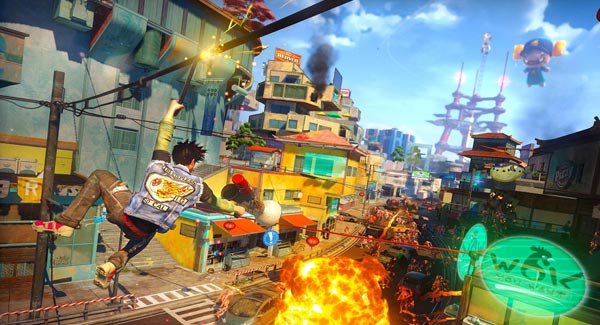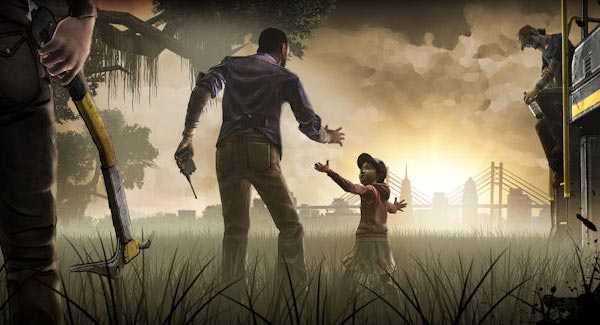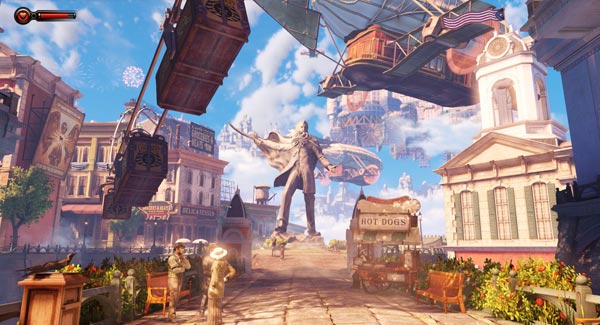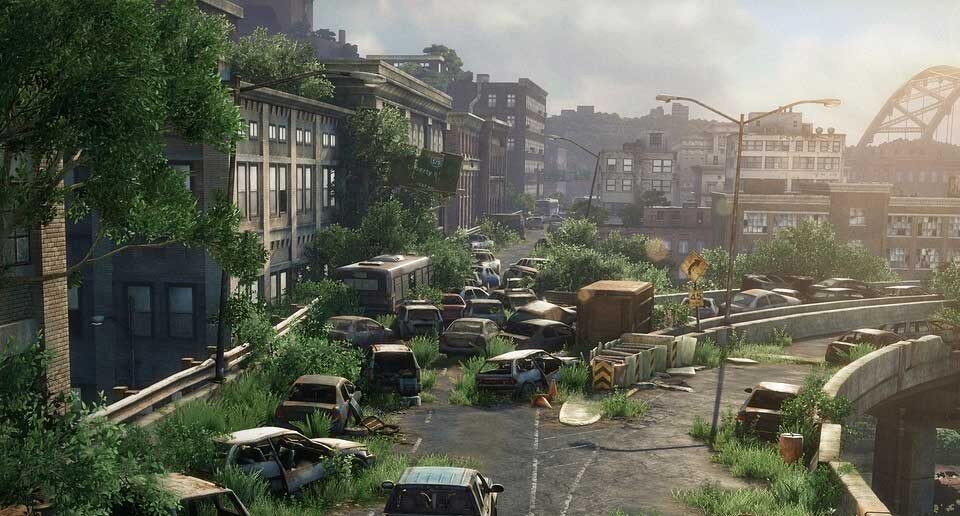Also, not too long ago, I discovered the absolute nightmare of trying to explain to my non-gamer housemates why I spent the best part of my day playing a game that simulates an immigration checkpoint. Amid the raised eyebrows and side-glances, I muttered phrases such as ‘Orwellian nightmare’ and ‘interactive dystopia’, which somehow, incredibly, got me off the hook. The conversation resumed to standard topics, such as whether Miley Cyrus counts as a sex-positive feminist and can a litre of gin be too much gin (answer to both: absolutely not).
But I couldn’t help but think more about why Papers, Please is such an addictive game when it should be, when you consider the actual gameplay, mind-bendingly dull. The setting, however, of an authoritarian, jingoistic dystopia set in east Europe, is both thought-provoking and politically charged. Glory to Arstotzka. Glory to dystopias.

Dystopia in games is hardly a recent phenomenon, yet many recent best-selling games all bear a strikingly common theme in their construction of digital hegemonies. The Last of Us, Thief, Dishonoured, Bioshock Infinite, InFAMOUS, Watch Dogs; it seems that dystopia is the theme du jour, and thanks to the creative teams behind these games we can see how genre and graphics influence the kind of dystopia portrayed on our screens. From the grim, pixelated immigration booth in the aforementioned Papers, Please to the sugary-sweet, comic book-esque city from Sunset Overdrive, oppressive and/or post-apocalyptic worlds make for some seriously interesting gaming.
So, in order to differentiate between the many, many dystopian games currently on the shelves (and my wish list on Steam), lets separate the strands of sub-genre in dystopia. Conrad Ostwalt’s book Secular Steeples defines two types of dystopia: secular apocalyptic, where humans must overcome the apocalyptic threat through unity, technology and/or military force, and sacred apocalyptic, whereby the human race must endure the hegemony until some act of divine intervention. Quite obviously, games will naturally take the form of secular apocalyptic in order to appeal to the gaming community. These are people who play first-person shooters, after all, and waiting around for divine intervention seems to me a little passive.
So, to delve a little deeper into classification of dystopian sub-genres, I would propose that there is a scale that dystopian games sit on. On one side is the dystopia which presents a familiar society modelled on our own with minor alternations that set it slightly off-kilter from realism – think Watch Dogs or Mirror’s Edge. On the other side is the dystopia that presents a completely fabricated world utterly separate from ours, like Rapture in Bioshock.
When dystopia is utilised to critique or comment on our current society, both sub-genres can accomplish this in different ways. The first is rather obvious – familiarity breeds comparison, and therefore playing a game similar to our current society will obviously deem us to make comparisons. As Papers, Please is an exaggerated version of many totalitarianism, oppressive regimes that have plagued our history (and are still unfortunately active), playing within a similar hegemony leads one to become immersed in this world and fully question the morality of such political regimes.
The second sub-genre, on the other hand, is a little less straightforward. Rather than using familiarity as a way to critique, games such as Sunset Overdrive use an almost Brechtian technique of presenting current issues in a world so separate from ours that, through being distanced by unfamiliarity, we then are able to examine these issues without bias. Yes, there aren’t any energy drink-fuelled mutants from Sunset Overdrive careering around Piccadilly Circus, but doesn’t the notion of corporations selling under-tested products in order to cut costs sound rather familiar? To everyone reading this article on their bent iPhones, I’m looking at you.

Of course, it is impossible to discuss dystopia in games without referring to perhaps the most popular and oft-referenced dystopia in popular culture, which is of course the zombie apocalypse. The reason why zombie dystopias work so well is that they feed (pun intended) off of our fear. The fear of actual walking corpses for starters, of course, but also the fear that a zombie apocalypse could actually happen – more specifically, the fear that the society that we depend on could utterly disintegrate. Without a first-world infrastructure, we would have to regress into a more primal hegemony, requiring survival skills long forgotten or obsolete. You can install a firewall, easy, but make an actual fire? Unthinkable.
On the other hand, one could argue that our obsession with the concept of a zombie apocalypse stems not from the fear of an unravelling society, but a desire towards it. Social status in an apocalyptic world is not dependant on having a cushy job as an investment banker or a 1,000-strong following on Instagram; a hierarchy is formed based on Darwinian principles of survival. For those who are disillusioned with our current social structure, the concept of a post-apocalyptic dystopia can become somewhat appealing; the opportunity to start afresh, on an even playing field, in a morbid fantasy that explores the human capacity for survival and violence.
The zombie games I am referring to are more than the bubblegum horror of Lollipop Chainsaw; these are emotionally-driven, narrative-based games that present moral dilemmas that make even Sophie’s Choice appear superficial. Take The Last Of Us: obviously most of us believed that Joel’s decision to choose Ellie over the rest of humanity was the wrong choice to make, even though fake Ellen Page is totally badass. But when you think about it, would the vaccine really have solved anything? Yes, people would then be immune to the Cordyceps spores, but in terms of reversing the post-apocalyptic hegemony it doesn’t seem to be a viable solution. At this point, two decades after the initial outbreak, the human population are either living in oppressive quarantine zones or small independent communities, having fully regressed into survival mode. Trying to rebuild a society at this point would be virtually (again, pun intended) impossible. And, of course, this leaves the story open for Naughty Dog to develop a sequel.
Similarly, The Walking Dead is far more than a standard zombie FPS; its complex, emotionally-charged narrative focuses on the characters trying to readjust and survive the apocalypse rather than killing hordes of zombies (although the developers at Telltale Games were kind enough to throw in a couple of action-packed Quicktime Events to satisfy us). The game explores the psychology behind this regression into primal survival mode and the concept of tribe mentality, where loyalties form and fall in a group that dwindles throughout the narrative. The phrase ‘survival of the fittest’ comes to mind when the weak, both in mind and body, succumb to the undead.
Your role as Lee (and later Clementine in the subsequent sequel) is to make your own decisions on who to side with, who is not to be trusted, and each of these decisions have, at times, lethal consequences. Like most people who played both games, each ending left me as a hollowed-out shell of emotion, curled up in the foetal position by my laptop thinking I would never experience joy again. The reason why The Walking Dead works so well as a dystopian game is its focus on the human relationships that are forged in a post-apocalyptic world.

So why does dystopia work so effectively in video games? Well primarily, the dystopian worlds in literature and film are limited; often it is not explained how these worlds came to be, and although the narrative may challenge these worlds, there is an element of staticism. Because the medium of the video game is allowed to be so expansive, its narrative spanning far over the allocated two hours of a film, there is room to explore the whole historical process as a way to deepen the immersion between player and game.
Furthermore, the active participation involved in game playing allows for a first-person experience of the dystopian hegemony, and the narrative is shaped by the player’s actions. The Bioshock franchise is particularly effective and accomplishing this. Both Rapture and Colombia are representations of a ‘critical dystopia’, which present classic notions of utopian ideals that critique to concept of utopia in itself. The detail within these worlds are exquisite – the propaganda plastered everywhere, the audio diaries that provide background information and strengthen the narrative, the references to popular culture (spot the Star Wars reference in Infinite, anyone?) – all of these factors create incredibly complex worlds that can be so easily immersed within. This of course only strengthens the critical message laid within the game – remove the underwater/airborne context and there lies a critique of the classic American Dream ideal. All video games are equal, but some are more equal than others.

Even the hyper-violent, quasi-fictional worlds of the GTA franchise, it could be argued, form a cautionary parable of the intrinsic bloodlust and corruption within our institutions, where the law enforcement, media and politicians are more criminal than…well, the criminals themselves. The controversial, nausea-inducing torture scene in GTA V is followed by Trevor’s musings that:
‘The media and the government would have us believe that torture is some necessary thing. We need it to get information to assert ourselves […] Tortures for the torturer. Or the guy giving orders to the torturer. You torture for the good times – we should all admit that. It’s useless as a mean of getting information!’
I can’t help but feel concern that a sociopathic (albeit fictional) redneck is more aware of the flaw within interrogative practices than most of us. This is a man who humped a teddy bear, after all.
So, ultimately, why are we so obsessed with dystopias? Much like Animal Farm was written after Orwell’s experiences of the Spanish Civil War, so are dystopian games provoked by national crisis and pre-existing fear of impending doom, genocide, natural disasters, and political disruption. After the Leveson inquiry, intrusion by the NSA and even (for those who ashamedly read Buzzfeed Lifestyle) leaked celebrity nudes, when has the phone and internet-hacking practices displayed in Watch Dogs ever been more relevant?
The narrative tool of a dystopian world works so well within the video game medium because it explores potential outcomes to social problems in a fully immersive world – a beta test for society, if you will. Well, that’s what I plan on telling my housemates next time they catch me playing Papers, Please, anyway.






